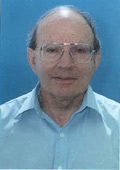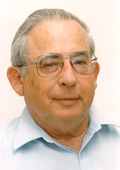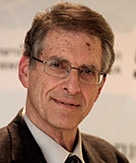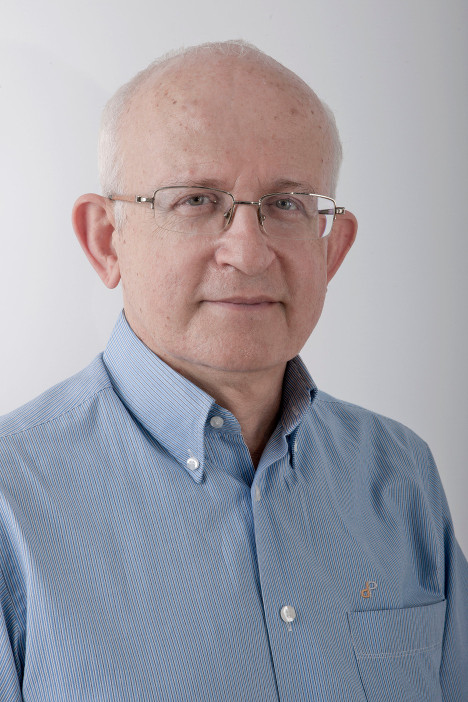Past Directors
 |
Professor Yuval Ne'emanThe first Director of the IAS (1979-1997), who initiated the foundation of the institute together with the Sackler Family. |
Professor Yuval Ne'eman (1925-2006) was born in Tel-Aviv, a grandson of one of the city's founders. He studied mechanical and electrical engineering at the Technion (Israel Institute of Technology), Haifa, then worked as a hydrodynamical designer for a year. He joined the Hagana and when this organization gave birth to the Israel Defense Forces, he stayed on for 12 years, fighting Israel's 1948 War of Independence as a commander in the field, serving later as a Vice Chief of Operations at the High Command. As Colonel, Head of Defense Planning he laid the foundations of Israel's mobilization system and crystallized the strategic conception prevailing until 1967 and tested in the Six Days War. Prof. Ne'eman turned to science in 1958, studying at Imperial College in London while serving as Israel's Defense Attache in the U.K. In the early sixties new particles were being discovered and the number of different 'elementary' particles was nearing one hundred. Prof. Ne'eman identified the pattern and his 'SU(3)' classification (also known as the "Eightfold Way") has been compared with Mendeleyev's Periodic Chart of the Chemical Elements. It was experimentally validated (1964) when the Omega-Minus particle, predicted by this scheme, was observed at Brookhaven N. L. (USA). Ne'eman was also the first to suggest that particles experiencing the Strong Nuclear Force, such as protons or neutrons, are composite and are made of three fundamental "bricks" - later to be known as Quarks, when Gell-Mann (who had also later independently arrived at SU(3) though he never published it) and Zweig further developed the notion. Prof. Ne'eman contributed to important further advances in particle physics, cosmology, astrophysics, and epistemology.
Since 1977, Prof. has developed an interest and a parallel line of work, generalizing the theory of Evolution and formulating a universal paradigm, then also applying it to various areas, especially Social Anthropology and Evolutionary Epistemology.
Prof. Ne'eman was the founder and Head of the Department of Physics and Astronomy at Tel-Aviv University (1965-1972), President of Tel-Aviv University (1971-1975), and served as Director of the Mortimer and Raymond Sackler Institute of Advanced Studies at TAU (1979-1997). In 1969, he established the School of Engineering as founding Dean, and between 1997 and 2002 he was President of the Israel Association of Engineers. He also founded the Center for Particle Theory at the University of Texas (Austin) in 1968 .
Prof. Ne'eman founded and chaired the Israel Space Agency (1983). He has also served on Israel's Atomic Energy Commission (1965-1984), chaired it (1982-1984), and held the position of Scientific Director in the IAEC Soreq Establishment (1961-1963). Prof. Ne'eman was Israel's Chief Defense Scientist betrween 1974 and 1976. He served as President of Israel's Bureau of Standards betrween 1972 and 1976, and chaired the Steering Committee to the Med-Dead Conduit Project betrween 1977 and 1983. He was Israel's first Minister of Science and Development betrween 1982 and 1984, then again betrween 1990 and 1992, when he also served as Minister of Energy.
Prof. Ne'eman has published over 350 scientific papers and 20 books. He was a Member of Israel's National Academy of Sciences, a Foreign Associate of the National Academy of Sciences of the USA, a Foreign Honorary Member of the American Academy of Arts and Sciences, an Honorary Life-Member of the New York Academy of Sciences, a Member of the (Brussels) European Academy of Sciences, a Member of the International Academy of Astronautics, and of several other learned societies. He has been awarded the Weizmann Prize (Tel-Aviv, 1966), the Rothschild Prize (Jerusalem, 1968), the Einstein Medal (Washington, 1969), the Israel Prize (1969), the College de France Medal and the Officier's Cross of the French Order of Merit (Paris, 1972), the Wigner Medal (Istanbul-Austin, 1982), the Birla Science Award (Hyderabad, 1998), the EMET Science Prize (Jerusalem, 2003) and honorary doctorates by universities in the USA, Germany, Russia and Israel.
 |
Professor Saul AbarbanelDirector of the IAS from 1997 to 2003. |
Saul Abarbanel (1931-2017) was born in Montclair, New Jersey, USA. He grew up in Tel-Aviv and served in the IDF during the War of Independence (1948-1950). He then went to the United States for his university education and received all three degrees (B.Sc, M.Sc, PhD) from MIT. The first two were in Aeronautics and Astronautics, and the doctoral dissertation in Theoretical Aerodynamics. He did his post-doctoral work at the department of Applied Mathematics at the Weizmann Institute of Science, Israel (1960-1961). He was then appointed Assistant Professor at MIT (1961-1964). In 1964, he was appointed Associate Professor and Head of the department of Applied Mathematics at Tel-Aviv University, and in 1970, promoted to Professor.
Prof. Abarbanel also served in succession as the Dean of Science, Vice Rector and Rector of Tel-Aviv University (1966-1980). He was consultant to NASA and Visiting Professor at various times at MIT, Brown University and University of California, Berkeley. He served as Chairman of the National Research Council of Israel (1986-1993), was awarded the Scientific Achievement Award by NASA (1992) and the IBM Distinguished Visiting Research Professor at Brown University (2003-2017).
Prof. Abarbanel was the director of the Sackler Institute of Advanced Studies from 1997 to 2003.
 |
Professor Abraham NitzanDirector of the IAS from 2003 to 2015. |
Professor Abraham Nitzan was born in Israel in 1944. He received his B.Sc. in chemistry (1964) and M.Sc. in physical chemistry (1966, with Prof. Gidon Czapski), both from the Hebrew University; and his Ph.D. in 1972 (with Prof. Joshua Jortner) from Tel Aviv University. He had a postdoctoral Fulbright Fellowship at MIT, was a research associate at the University of Chicago, and taught at Northwestern University before joining the Faculty at Tel Aviv University. At TAU, he has been a Professor of Chemistry since 1982; served as Chairman of the School of Chemistry between 1984 and 1987, and Dean of the Faculty of Science between 1995 and 1998. Prof. Nitzan's research is in the field of chemical dynamics and transport phenomena in condensed phases. He was elected Fellow of the American Physical Society (1993) and of the American Association for the Advancement of Science (2003); has been a Foreign Honorary Member of the American Academy of Arts and Sciences (2006); has received the Kolthof Prize (1995), The Humboldt Award (1995), the Israel Chemical Society Prize (2002), the Israel Prize (2010), and the EMET Science Prize (2012).
Prof. Nitzan was the Director of the Sackler Institute of Advanced Studies from 2003 to 2015.
 |
Professor Marek KarlinerDirector of the IAS from 2015 to 2025. |
Prof. Marek Karliner (b. 1955) is a theoretical physicist and Professor Emeritus at the School of Physics, Tel Aviv University. He earned all his degrees at Tel Aviv University, completing his PhD in 1984 under the supervision of Prof. David Horn, and spent a year as a Fulbright fellow at Stanford University.
Following postdoctoral work at Stanford’s SLAC National Accelerator Laboratory and the Weizmann Institute, Prof. Karliner joined Tel Aviv University in 1988, receiving the Alon Fellowship for outstanding young faculty. He became Associate Professor in 1990 and Full Professor in 1995. He has held leadership positions including Chair of the Raymond and Beverly Sackler Institute for Theoretical Physics (2010–2015) and Head of the Particle Physics Department (2006–2010).
Prof. Karliner’s research focuses on theoretical particle physics, in particular quantum chromodynamics and strong interactions. Together with Jonathan Rosner, he accurately predicted the mass of the rare ++Xi-cc particle several years before its experimental discovery at CERN, as well as the Tcc+ tetraquark, confirmed in 2021.
He has served as a visiting professor at the Cavendish Laboratory, Cambridge, and is a foreign member of the Polish Academy of Arts and Sciences. From 2019, he chaired the Israeli High Energy Physics Committee coordinating Israel’s collaboration with CERN. Prof. Karliner retired in 2023 but continues to engage actively in research.
Selected Honors: Alon Fellowship, Weizmann Postdoctoral Fellowship, Fulbright Fellowship, Edward & Francoise Joffe Chair in Theoretical Particle Physics, Outstanding Reviewer Award (Physics Letters), membership in the Polish Academy of Arts and Sciences.
Prof. Karliner was the Director of the Institute of Advanced Studies from 2015 to 2025.

